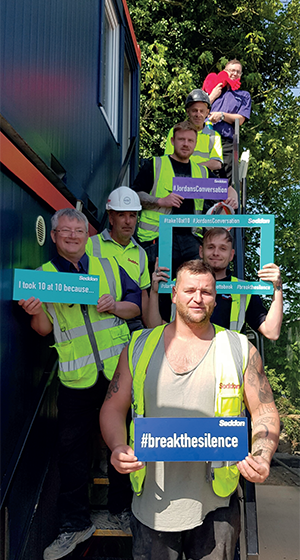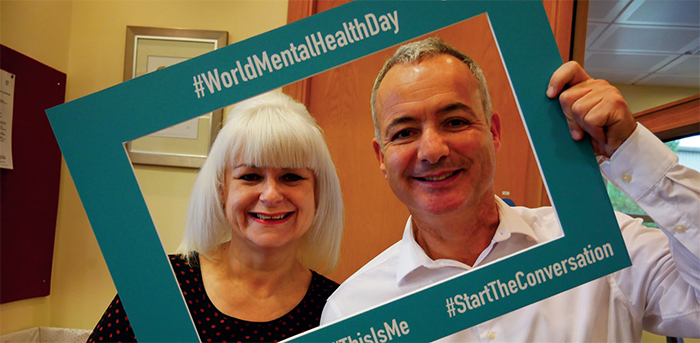How mental health is related to physical health on construction sites
Safe in mind
Nicola Hodkinson, owner and director of Seddon and trustee of Mates in Mind, is a fervent mental health advocate in an industry that loses two lives a day to suicide. Here, she explores why employees that are safe in mind are more likely to be safe on-site and why it’s crucial the industry does more to create a supportive environment for its employees.
Stress and mental health issues are prevalent in every workplace, from racing to meet tight deadlines to supply chain pressures. As nearly 70 per cent of our year is made up of working days, it’s an environment that can have an enormous influence on our mental state. In the current climate of rising inflation and the cost-of-living crisis especially, there are now even more pressures on individuals that can affect mental health.
 The construction industry is perhaps most vulnerable to mental wellbeing challenges. Statistics from Mates in Mind, a mental health in construction charity, revealed that suicide rates in the industry are three times higher than the national average. When the black clouds are looming, it can directly impact the integrity of work on-site, meaning there is a direct correlation between mental health and on-site safety. An equilibrium between the two is needed and it’s a balance that can only be struck with an industry-wide approach to making construction a safe space for discussing mental health.
The construction industry is perhaps most vulnerable to mental wellbeing challenges. Statistics from Mates in Mind, a mental health in construction charity, revealed that suicide rates in the industry are three times higher than the national average. When the black clouds are looming, it can directly impact the integrity of work on-site, meaning there is a direct correlation between mental health and on-site safety. An equilibrium between the two is needed and it’s a balance that can only be struck with an industry-wide approach to making construction a safe space for discussing mental health.
Creating an open culture
Almost one third of construction workers are living with elevated levels of anxiety each day, with the continuing stigma of mental illness preventing them from discussing it beyond close friends or family members. In a recent survey, in association with Mind, 85 per cent of tradespeople said they don’t feel comfortable talking about their mental health with others, despite 82 per cent having suffered from mental health issues. For that, the typically ‘macho’ environment of the industry is often to blame. That stigma has established a closed-off culture, one which we’re desperate to open up.
Toolbox talks are a perfect way to begin broaching the sensitive topics of mental health in a safe environment, where confidentiality is crucial. Conversations must centre around the talker’s feelings, with the listener expressing empathy whilst reserving judgement.
Resilience workshops, which offer guidance on how to distinguish between pressures and stress, as well as develop positive mental wellbeing habits, are particularly useful for site managers. Training sessions like these help the listener identify often subtle signs that an employee is struggling. They emphasise the importance of noting body language and behavioural changes because when a colleague says they’re fine, that isn’t always the case.
Recent statistics show that the industry loses two lives a day to suicide, compared with 30 reported fatal incidents on sites in 2021. Therefore, mental health risks should be something on-site workers and site managers look out for with the same importance as they do physical risks. If a positive mental health culture can become the standard, the industry can turn the tide of the negative statistics that plague it and become a much more supportive place when the going gets tough.
Empowerment through training
Be it recognising a co-worker is struggling mentally or spotting a potential safety risk before any danger arises, there’s a need to understand the importance of empowering our staff with the knowledge to make a difference. Through training and cross-departmental conversations, we can teach our staff best practices and ways to deal with difficult situations. This is especially the case for conversations around mental health, as these can be difficult to begin and successfully navigate. It also helps instil a receptiveness to new ideas and ways of working within our teams, allowing our policies and approaches to continually evolve. Health and safety should never be perceived as stationary or straightforward.
Learning from experience
Employee wellbeing is ever-evolving, and the industry must always be forward thinking and poised to adapt. It’s hugely important that everyone, especially decision-makers within the industry listen to what their employees have to say and that, as a collective, we are offering solutions rather than simply highlighting problems. We must openly consult with our employees on matters and decisions that may affect them to understand their perspectives and act upon them to refine our policies.
These meetings provide the platforms to engage in employee-led conversations around mental wellbeing and health and safety. That means the formation of key risk assessments is influenced by those on the ground who are closest to the project. If there are constant lines of communication between decision-makers and on-site workers, we can help ease their work-related pressures and the associated anxieties.
Building on the right foundations
If these talks and training sessions are to be fruitful, attention must be paid to the overall working environment. Working practices and business norms play a big part in creating a positive culture where these initiatives can thrive. If you can establish an environment where collaboration is strong, where the workload and resulting pressures are split evenly across teams, hard work is rewarded, colleagues support one another and employees feel valued. You are laying the foundations upon which positive mental wellbeing and a culture of health and safety can be built. If employees feel the business truly cares for them, that care will be reciprocated. The right working environment lowers absence levels, heightens staff retention, and improves productivity, leaving staff feeling empowered by policies and taking greater pride in their work. Positivity, care, and best practices trickle down from the top, so it is crucial businesses lead by example.
Ultimately, health and safety is about employees knowing their employer is doing everything they can to keep them safe. Health and safety policies should make individuals feel their workplace is somewhere they can open up about mental health matters and that there is support for them whenever they need it. Only then can the industry be confident in its approach to mental wellbeing and health and safety.
For a list of the sources used in this article, please contact the editor.
Nicola Hodkinson
www.seddon.co.uk
Seddon provides end-to-end integrated property services for customers across the North West and Midland regions and is headquartered in Bolton, Greater Manchester. From planning and procurement to construction, fit-out and refurbishment, and onto property services, the company works across multiple industries including housing, care, education and retail, with a loyal customer base in both the public and private sectors. Built on family values, Seddon has a group turnover of circa £200 million and a direct workforce of more than 250 professionals, craftspeople, technical staff and trainees/apprentices.
